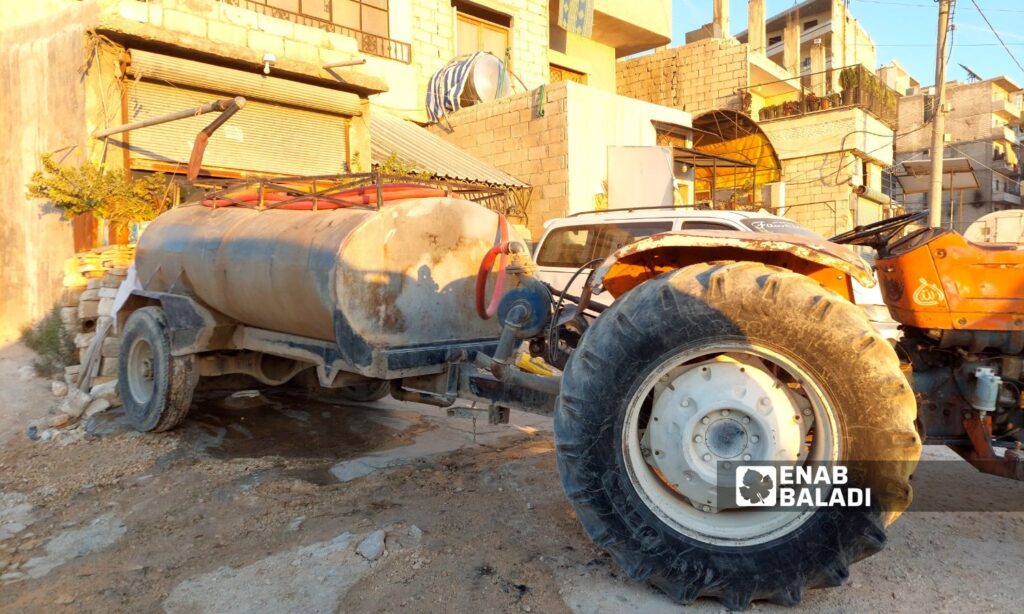Azaz – Dayan Junpaz
The residents of Ma’arin village, which belongs to the city of Azaz in northern rural Aleppo, have been experiencing a potable water shortage crisis for years that worsens every summer due to the interruption of the main water supply, without any solutions in sight.
The village’s approximately 500 families are forced to rely on unregulated and expensive water tankers, exacerbating their daily plight amid tough economic conditions, according to villagers interviewed by Enab Baladi.
High costs
Hannan Ali, a villager, depends on water tankers filled from the village and neighboring villages’ sources. He told Enab Baladi that it is their only means of quenching the villagers’ thirst, noting that their price is a heavy burden.
Ali added that he pays 220 Turkish lira ($6.5) for a 10-barrel capacity tanker and needs to buy two tankers monthly to meet his and his wife’s needs.
His irregular income from seasonal agricultural work does not match his needs, as his daily wage ranges between 75 and 100 Turkish lira, without a consistency in such work, as he stated.
Tanker prices do not match the income levels of most workers in northern Syria. The daily wage for a worker does not exceed 100 Turkish lira, while the extreme poverty line is about 9000 Turkish lira per month.
No regulation or solutions
The tankers are not subject to health or price regulations, allowing their owners to control prices, especially in summer when demand increases.
Yousef Khalo, another villager, told Enab Baladi that the lack of regulation allows tanker owners to set prices based on their whims, forcing residents to pay increasing amounts for water.
He added that often, especially when he unexpectedly runs out of water in the evening, he is compelled to pay more than usual, sometimes up to 250 Turkish lira per tanker, due to the tanker owners exploiting the need.
Khalo called on the concerned authorities and humanitarian organizations to find practical solutions, such as digging wells in the village or seeking alternative water sources at reasonable costs to lessen the financial burden on the residents and ensure continuity in water supply at affordable prices.
The village chief, Ali Kousa, told Enab Baladi that the 500 families have been suffering from water cuts for nearly ten years.
He added that he and the village elders approached the local council in Azaz demanding water for their village and also asked several local organizations without receiving any responses or tangible solutions.
Several villages and towns in rural Aleppo experience severe shortages in basic services, including water supplies.
Many villages and towns in rural Aleppo, including Azaz, struggle to consistently secure drinking water due to reliance on existing artesian wells before starting to pump water from Lake Midanki near Afrin, following the Turkish military and the Syrian National Army’s control of the Afrin area during Operation Olive Branch, launched by Turkish forces against the Syrian Democratic Forces (SDF) on January 20, 2018.
Northwestern Syria is home to 5.1 million people, of whom 4.2 million need assistance, 3.4 million suffer from food insecurity, 3.4 million are internally displaced, and 2 million live in camps, according to the United Nations, while local statistics report 5.5 to 6 million people.











